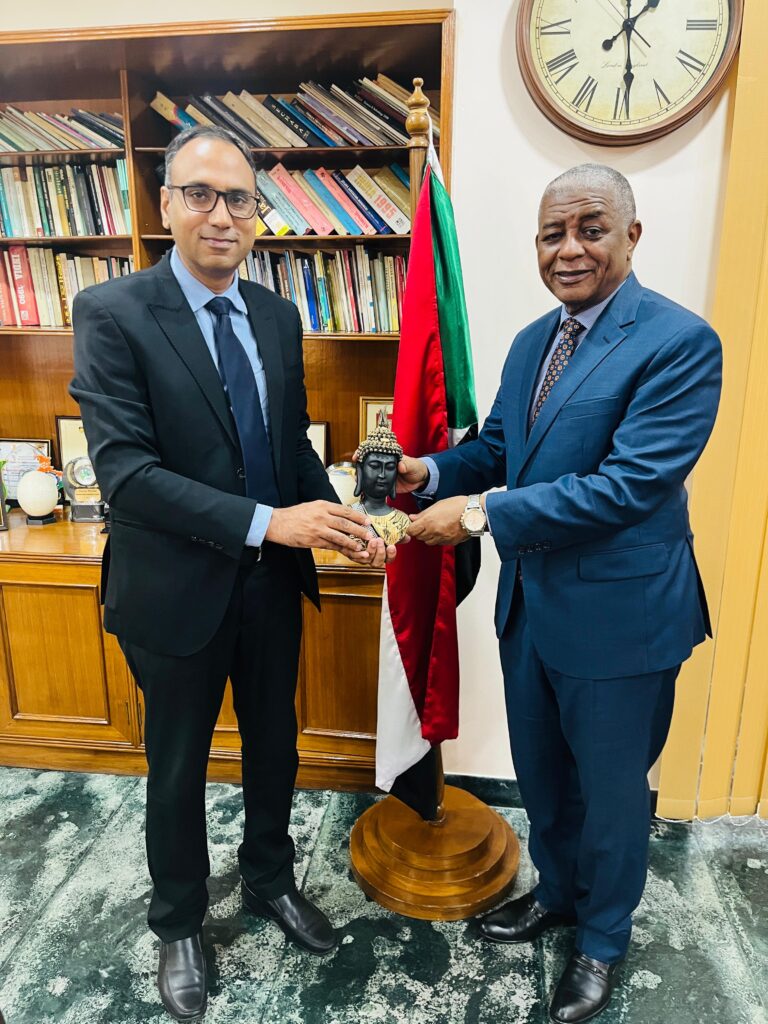When I met Dr. Mohammed Abdalla Ali Eltom, the Ambassador of Sudan to India, I did not just meet a diplomat — I met a voice carrying the hopes of a nation ready to rise from its trials, writes Rao Narender Yadav, Director, African Centre of India

Last week, I had the privilege of meeting Dr. Mohammed Abdalla Ali Eltom, the Ambassador of Sudan to India — a conversation that was as much about the future as it was about resilience. The meeting left me deeply moved, not only by the Ambassador’s personal conviction, but by the vision he carried on behalf of the political leadership of Sudan: a vision to rebuild a nation scarred by conflict, yet unbroken in spirit.
Sudan is the third-largest country in Africa geographically, blessed with the large proportion of arable land. In Dr. Eltom’s eyes, this was not merely a statistic; it was Sudan’s untapped promise — a natural wealth that, if nurtured with the right partnerships, could feed not only its own people but also contribute to Africa’s food security.
As we spoke, Dr. Eltom’s words were charged with both urgency and hope. He painted a picture of Sudan determined to rise from its present trials — not with mere reconstruction of infrastructure, but with a deeper reconstruction of institutions, livelihoods, and trust among its people. It was not a speech of wishful thinking; it was a carefully charted aspiration anchored in the belief that nations can heal when they harness the right partnerships.

What struck me most was his faith in India’s journey. He spoke with genuine admiration of our Solar Alliance leadership — how India had shown the world that sustainable energy was not just a climate commitment, but a tool of empowerment for rural communities. He saw parallels for Sudan, a country blessed with vast sunlight yet still waiting to fully harness it for its people’s prosperity.
Our discussion moved to agriculture, and his eyes lit up when speaking of India’s agri-tech solutions — from new varieties of seeds, solar powered water pumps to climate-smart farming techniques. He envisioned Sudan’s fertile lands transformed through these innovations, enabling farmers to produce not only for survival but for export and economic strength.
Dr. Eltom’s respect for India’s achievements in IT and Digital Public Infrastructure (DPI) was equally profound. He understood that digital access is not merely a convenience but the backbone of transparent governance and economic inclusion. In his mind, India’s experience with platforms like Aadhaar, UPI, and digital governance could inspire Sudan’s own leap into the digital age, bypassing decades of slow, conventional development.
Our SMEs too found a place in his vision — he saw in them the seeds of grassroots economic revival, adaptable to Sudan’s realities and capable of creating jobs with relatively small investments. It was a reminder to me that India’s greatest export is often not its goods, but its models — ways of working that can be adapted and adopted by those who seek change.
By the end of our conversation, I realised this meeting was not just about Sudan seeking India’s support. It was about two nations recognising in each other a shared belief — that resilience is built when people dare to innovate despite scarcity, and that partnerships flourish when they are rooted in mutual respect and understanding.
Walking away from the meeting, I felt a quiet conviction that Sudan’s road ahead, though steep, is not solitary. India’s own story — of navigating challenges with innovation, inclusivity, and determination — offers both lessons and companionship for Sudan’s reconstruction journey.
(African Centre of India (ACoI) is an independent Think-Tank based in Delhi-NCR)